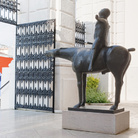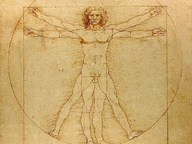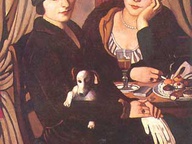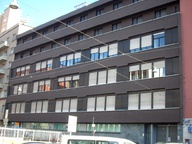The Angel of the City
Marino Marini drew on the tradition of Etruscan and Northern European sculpture in developing his themes of the female nude, the portrait bust, and the equestrian figure. By interpreting classical themes in light of modern concerns and with modern techniques, he sought to contribute a mythic image that would be applicable in a contemporary context. The evolution of the subject of the horse and rider reflects Marini’s personal response to that changing context. The theme first appears in his work in 1936, when the proportions of horse and rider are relatively slender and both figures are poised, formal, and calm. By the following year the horse rears and the rider gestures. In 1940 the forms become simplified and more archaic in spirit, and the proportions become squatter. By the late 1940s the horse is planted immobile with its neck extended, strained, ears pinned back, and mouth open, as in the present example, which conveys affirmation and charged strength associated explicitly with sexual potency.
COMMENTI
LE OPERE
Map
Works in Italy
Works around the world



